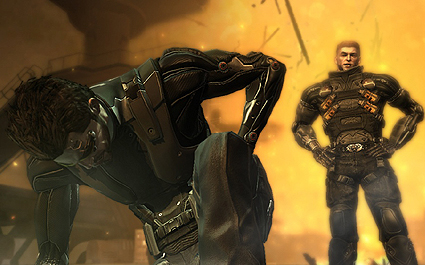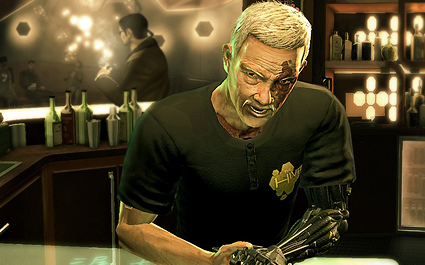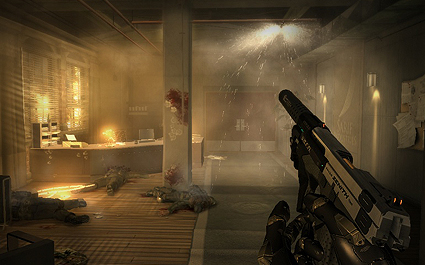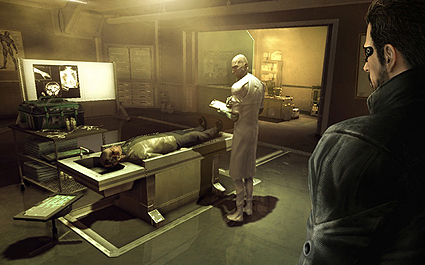Reviews
Review: Deus Ex: Human Revolution
September 14, 2011, Author: Jesper Hauerslev
The future is coming, and with it comes promise of a better life, a better world and even a better kind of humanity, through the marvel of technology. In fact, the future is closer than you think. As time has gone by, technology has been marching closer and closer to the human body itself.
It started out with a massive computer sitting in a warehouse somewhere… then it got a little smaller and moved onto a desk in your house… then it got even smaller and jumped onto your lap. Then it got even smaller still and leapt into your pocket, and we’ve already seen examples of it jumping into the body itself: artificial limbs, glass eyes with miniature cameras, and even artificial hearts. The future is closer than you think, and Deus Ex: Human Revolution is a wake-up call for you stand up and take notice.
A brand new man
The year is 2027, and humanity is on the brink of a seismic shift in its evolution. This time though, the evolution is not happening as a natural response to changes in the surrounding world. This time, mankind is orchestrating its own evolution with the use of augmentation technology. Arms, legs, eyes, spines, skin and other parts of the body are being replaced with artificial counterparts, allowing the body to do things it wouldn’t normally do.
With such powerful technology comes both great possibilities and ethical dilemmas. While augmentation can make you into the person you always wanted to be, it comes with a hefty price tag, so not everybody will be able to afford it. This means that the rich will get stronger, faster and better, while the poor remain normal and get left behind in the evolutionary race.
Some people believe this is truly the next step for human evolution, while others are strongly in opposition. Both sides have fanatical factions within them that are constantly waging a war of words, and sometimes direct action, against the other. Deus Ex: Human Revolution throws you right into the middle of this melting pot and lets you navigate a dangerous world of corporate intrigue, political agendas and secret conspiracies.
You play as Adam Jensen, head of security for Sarif Industries, one of the leading corporations in the field of augmentation. The game starts with what seems like a regular day at the office, when highly trained mercenaries suddenly attack and brutally execute every scientist working on one of Sarif’s top-secret projects, including Adam’s girlfriend, Megan. To reveal more would be to spoil too much of the story, but suffice to say that Adam only barely survives the encounter, and is then stitched back together again with the latest in augmentation technology, replacing several parts of his severely broken body.

Adam had hoped his new augmented body would allow him to finally get rid of that sadistic gym instructor of his.
Once back on the job, Adam sets out on a personal vendetta to find answers, and Megan’s killers, which is much easier said than done. You will explore several different locations around the world, from Detroit and Montreal to Shanghai, and find yourself sneaking and/or shooting your way through police-stations, corporate headquarters, secret military facilities, and more. How you make your way through these various locales is entirely up to you, because Deus Ex: Human Revolution is all about choice.
Augmented gameplay
Choice has always been a central pillar of the Deus Ex series. The original from 1999 was one of the first to really make player choice work in a game, and to allow you to successfully adapt different play-styles to suit different situations, or simply your mood. Human Revolution proudly continues this legacy by offering you several ways to approach any given situation.
Yes, you could simply blast your way into that police station and take everybody out, or you could look for another way in and sneak your way past the guards. Or you could try to bluff your way inside. Or you could dig up dirt on one of the cops and blackmail him to let you in. Or maybe you’ll come up with something completely different.
Every choice has consequences though, and you must be prepared to face those consequences head-on as you progress through the game. This is especially true in how you deal with the people you meet. A person you save early on might reward you later, while someone you pissed off might be back for revenge at some point, or prevent you access to certain side-quests.
Deus Ex: Human Revolution encompasses two distinct play-styles, stealth and shooting, and it’s up to you how you utilise them. The game does a great job early on of showing you the basics of the two, and then steps aside to let you decide which style suits you best. It’s very rare to see a game take two directly opposing game-mechanics and make both work so well, but Deus Ex does just that.
The gun-play is exciting and brutal while the stealth is tense and thrilling, and enemies respond well to both. They will try to outflank you in gun-battles, and search for you high and low if you leave bodies lying around, get caught in their line of sight, or make too much noise while hiding. That said, they are basically doing what other enemies in similar games do, so don’t expect a huge leap forward in terms of enemy AI. You will therefore have to look past their limitations, and forgive their occasionally strange behavior. They will sometimes empty whole ammo-clips in the wall you are covering behind instead of conserving ammo, or a guard might stand right next to the box you are hiding behind and completely fail to notice you.
It’s not just enemy soldiers that act with these varying degrees of intelligence. You can hack people’s computers right in front of them, or steal items from a shop without the owner even flinching. Other games have these problems too, and while the AI in Deus Ex isn’t doing any worse than its competitors, it’s a real shame it’s not doing better.
Both play-styles make great use of the game’s sleek cover-system. A quick touch of a button, and Adam hugs the nearest wall or object while the camera zooms out to a third-person view. Another quick press and Adam quickly jumps from cover to cover, while holding the button down makes him move around corners. This comes in very handy during firefights, as well as when sneaking around. Both play-styles work well in isolation and the game can be played exclusively as one or the other. However, the true joy of the open-ended gameplay comes from mixing the two up and not being afraid to experiment. There is no right or wrong way to play, and the game never makes you feel like you are playing it wrong.

"You've got something on your face!"
The choice offered is further enhanced by the various augmentations Jensen has at his disposal. Unlike previous games in the series, Adam comes fully loaded with a number of augmentations from the get-go, but not all of them have been activated yet. To do this you use Praxis points, which are earned by exploring the world around you and solving main objectives and side-quests. When you activate the various augmentations is up to you, and they can directly complement your playing-style, change it or even get in the way of it, if you are not careful with your choices.
The augmentations are divided into different categories based on where in the body they sit. Augmenting his legs will allow Adam to run faster, jump higher and even run silently, while augmenting his arms lets him carry more stuff, stabilize his aim and lift heavy objects. Implants grafted to the skin let him soak up damage and turn invisible for short periods of time, while various augments in his skull allow him to hack computers, door locks and security-terminals.
Hacking is a key skill to have in Deus Ex regardless of how you play, as this allows you various ways to circumvent security or other obstacles, and get the drop on your enemies. For instance, some hacker-augmentations will allow you take control over security bots and gun-turrets, and turn them against your enemies. Not only is this an effective way to cause chaos, it’s also great fun to watch.
The art of hacking is done through a small but rather addictive mini-game. You are presented with a simple representation of a network with nodes, APIs and bridges. To complete the hack you have to take over the nodes, and plot a course to the override-function through the network via bridges, without alerting the system’s firewall. If that happens, you only have a limited amount of time to either finish the hack or disconnect, before you are discovered and the alarm is raised.
Luckily, you have various tools you can deploy to make the hack easier. You can nuke a node which hacks it instantly, or you can slow the firewall down by deploying a worm onto the system or by fortifying nodes. You can also hack APIs which will affect the network in either a negative or positive way, so this is always a gamble. A clever addition is directories which contain various data, experience points or even money, that you can get your hands on once you complete the hack. The flip-side of this is that directories are often located deep within the network, meaning you have to hack further, thereby increasing your chances of getting caught.
The augmentation arsenal also includes a few ‘specials’. One lets Adam influence people by releasing pheromones at certain points during a conversation, while another shoots out small explosive pellets from his arms and legs. This becomes especially handy when Adam is surrounded by enemies. The list goes on, and it’s great fun to experiment with various combinations. Some augmentations are more useful than others and some only become useful later on in the game, but none of them feel entirely useless.
Augmentations aren’t the only tool at Adam’s disposal. Weapons play a big part too, and just like everything else in Deus Ex you have a choice of arsenal. There are several different types of weapons to choose from, from various handguns and rifles to rocket-launchers, energy-weapons and different types of grenades. These weapons can be enhanced further with laser-sights, silencers, bigger ammo-magazines, special ammo and so on.
There are no melee-weapons to choose from, as Adam already has this covered. He can either beat up his opponents, or brutally skewer them using hidden blades springing forth from his augmented arms. These melee moves look extremely bad-ass, especially when Adam takes on two enemies at the same time.

Amazing how much damage you can cause with a single gun!
Not everything involves shooting or sneaking, though. Early on in the game, Adam finds himself face-to-face with a terrorist threatening to kill a hostage. Here, you can choose to face the terrorist head-on in a gun fight, you can let him leave with the hostage and hope the police take him out… or you can try and talk him out of it.
This is where one of the game’s more innovative elements come into play: the verbal showdown! It’s basically a dialogue between you and the antagonist, where you have different ways of responding to what they say. They will respond in-turn, and the situation can turn quickly turn sweet or sour depending on how the conversation goes. These ‘verbal fist-fights’ almost take on the role of boss fights, and it’s quite exhilarating trying to counter-act the other person’s arguments and make the conversation play out to your advantage.
This is a relief, because the game also boasts some very traditional boss fights that don’t really do it any favors. This is mostly because they simply involve you versus the boss, the winner being the one that can pump the most amount of bullets into the other. This is fine if you play the game as a shooter, but it’s frustrating for people who prefer a more stealthy approach as they have to put up more of a fight. Boss encounters aren’t downright awful; they just seem out of place in a game that goes so much out of its way to give you many different options to approach any given situation.
Cyber-Renaissance
All of these countless choices come wrapped-up in a great looking game. Not so much in term of technical brilliance, however. The animations are rather stiff, and facial-animation looks a little dated. The game does spot some pretty nifty lightning effects though, and when Adam goes in for a melee attack, the camera zooms out dramatically to reveal the punishment in all of its gory detail.
The real graphical ‘wow’ comes from the overall design. The art direction borrows heavily from Baroque and Renaissance time periods, infused with a heavy cyber-punk aesthetic and then painted generously in black and gold colours. It’s a strangely eclectic choice of styles at first glance, but it works beautifully, as every element complements the other. It gives Deus Ex: Human Revolution a very distinctive look, but it does look slightly at odds with the look and feel of the other games in the series. These take place several years after Human Revolution and have a much more traditional cyber-dystopian feel to them. Purists might find this sudden style-shift rather jarring, but its a small detail, and nothing that will ruin your enjoyment of the futuristic world of Deus Ex: Human Revolution.
The sound of revolution
Complementing the great graphics is an equally great sound design, and a stunningly beautiful music score that really brings the dark world of Deus Ex to life. The voice acting is generally solid throughout, although the actor playing Adam tries way too hard to come across as Timothy Olyphant with a sore throat.
Your choice
Deus Ex: Human Revolution is a fine study in duality. It places itself firmly in the dichotomy between new vs. old, past vs. future, and man vs. machine. Adam Jensen is the very embodiment of this duality. His reluctance to embrace his new-found ‘transhumanism’, forced upon him by powers and events beyond his control, is painful to watch yet compelling to take part in. This duality translates seamlessly into the gameplay itself, and that is Deus Ex’s biggest achievement. The shooting and sneaking, while so fundamentally different, work so well together here. The adaptive gameplay is solid enough to cater for a wide variety of playing styles, thus ensuring maximum appeal.
Other games have tried to walk this tightrope, and most have fallen. Deus Ex: Human Revolution holds it’s augmented head high, however, making it one of those games that can get everybody excited, regardless of how much they play, or care about the subject matter. On top of that, the game has massive replay value. No matter how hard you try, you won’t get to see everything, activate every augmentation or fire every weapon in a single play-through. Sadly though, Deus Ex: Human Revolution has no multiplayer. It does fine without, but this still feels like a hugely missed opportunity, as the many ways you can experiment with augmentations and weapon-expansions lends itself so well to multiplayer gaming.
While the lack of multiplayer is slightly disappointing, one thing that does work in the game’s favour is that it actually has something to say. Looking past the shooting and the sneaking, Deus Ex asks us to question how technology affects our very humanity; when you can augment (or indeed replace) parts of your body to make it do things evolution never intended, where does the human end and the machine start? Is augmentation technology for the good or the bad of mankind?

Not even a futuristic cyber-thriller would be complete without a trip to a morgue.
If you enter this bleak, futuristic world with a wide gaze and take the time to explore, you will see both cases of this argument, and indeed, both present reasons compelling enough to prevent you from simply brushing them aside. You’ll often gain a deeper understanding of this overarching conflict by venturing off the beaten path. The world of Deus Ex lives and breathes through the various emails, newspapers and e-books you can pick up and read along the way, as well as conversations you eavesdrop on, or news broadcasts you watch. Some of these might even change your opinion of certain key characters, thereby affecting how you interact with them going forward.
Essentially, Deus Ex is about man playing God, and the ramifications of him doing so. This is not a new debate. It has come in various forms over the years, from abortion to cloning, but this is what gives poignancy and weight to the story and overarching dilemma. The world of Deus Ex may look black and gold, but the dilemmas it presents are as grey as ever.
The game also deserves kudos for delivering a fresh start to the Deus Ex-franchise, while still paying homage to the original. You don’t need to have any prior knowledge of the previous games in the series, but if you do, it adds an extra layer of thrills and fanboy glee when you cross paths with certain characters, or hear certain events being mentioned that will help mold the shape of things yet to come.
Of course, you can still ignore all of this and just play Deus Ex: Human Revolution for what it is: a great game with a great story, that lets you play in pretty much whatever way you want.
The choice is all yours.
Platforms: PC, PS3, Xbox 360 | Tagged action, augmentation, Deus Ex, FPS, human revolution, invisible war, PC, PS3, RPG, Shooter, single player, Xbox 360



